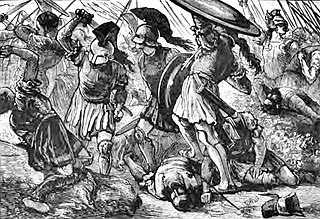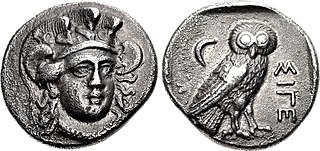
Year 342 BC was a year of the pre-Julian Roman calendar. At the time it was known as the Year of the Consulship of Ahala and Rutilus. The denomination 342 BC for this year has been used since the early medieval period, when the Anno Domini calendar era became the prevalent method in Europe for naming years.
Year 347 BC was a year of the pre-Julian Roman calendar. At the time it was known in Rome as the Year of the Consulship of Venno and Torquatus. The denomination 347 BC for this year has been used since the early medieval period, when the Anno Domini calendar era became the prevalent method in Europe for naming years.
Year 346 BC was a year of the pre-Julian Roman calendar. At the time it was known as the Year of the Consulship of Corvus and Visolus. The denomination 346 BC for this year has been used since the early medieval period, when the Anno Domini calendar era became the prevalent method in Europe for naming years.
This article concerns the period 349 BC – 340 BC.
This article concerns the period 429 BC – 420 BC.
This article concerns the period 359 BC – 350 BC.
This article concerns the period 339 BC – 330 BC.

This article concerns the period 329 BC – 320 BC.
Year 343 BC was a year of the pre-Julian Roman calendar. At the time it was known as the Year of the Consulship of Corvus and Arvina. The denomination 343 BC for this year has been used since the early medieval period, when the Anno Domini calendar era became the prevalent method in Europe for naming years.
The denomination 322 BC for this year has been used since the early medieval period, when the Anno Domini calendar era became the prevalent method in Europe for naming years.
Year 413 BC was a year of the pre-Julian Roman calendar. At the time, it was known as the Year of the Consulship of Cossus and Medullinus. The denomination 413 BC for this year has been used since the early medieval period, when the Anno Domini calendar era became the prevalent method in Europe for naming years.
Year 354 BC was a year of the pre-Julian Roman calendar. At the time, it was known as the Year of the Consulship of Ambustus and Crispinus. The denomination 354 BC for this year has been used since the early medieval period, when the Anno Domini calendar era became the prevalent method in Europe for naming years.
Demades was an Athenian orator and demagogue.

The Battle of Chaeronea was fought in 338 BC, near the city of Chaeronea in Boeotia, between Macedonia under Philip II and an alliance of city-states led by Athens and Thebes. The battle was the culmination of Philip's final campaigns in 339–338 BC and resulted in a decisive victory for the Macedonians and their allies.
Cersobleptes, was son of Cotys I, king of the Odrysians in Thrace, on whose death in September 360 BC he inherited the throne.

Chares of Athens was a 4th-century BC Athenian military commander (Strategos), who for a number of years was one of Athens's foremost commanders. He was also a well connected politician enabling him to procure the commands he desired, commands he primarily used to enrich himself and his adherents.
Peace of Philocrates is the name of the peace treaty concluded in 346 BC between Athens and Macedon under Philip II. Philocrates was the name of the main Athenian negotiator of the Treaty.
The "Third Philippic" was delivered by the prominent Athenian statesman and orator, Demosthenes, in 341 BC. It constitutes the third of the four philippics.
"On the Chersonese" is a political oration delivered by the Athenian statesman and orator Demosthenes in 341 BC. A short time later Demosthenes delivered one of his most famous speeches, the Third Philippic.

Under the reign of Philip II, the ancient kingdom of Macedonia, initially at the periphery of classical Greek affairs, came to dominate Ancient Greece in the span of just 25 years, largely thanks to the character and policies of its king. In addition to utilising effective diplomacy and marriage alliances to achieve his political aims, Philip II was responsible for reforming the ancient Macedonian army into an effective fighting force. The Macedonian phalanx became the hallmark of the Macedonian army during his reign and the subsequent Hellenistic period. His army and engineers also made extensive use of siege engines. Chief among Philip's Thracian enemies was the ruler Kersebleptes, who may have coordinated a temporary alliance with Athens. In a series of campaigns stretching from 356 to 340 BC, Philip II managed to ultimately subjugate Kersebleptes as a tributary vassal, conquering much of Thrace in the process. Philip II also fought against the Illyrian king Bardylis, who threatened Macedonia proper, and against Grabos II and Pleuratus in Illyria. In his newly conquered territories, he founded new cities such as Philippi, Philippopolis, Herakleia Sintike, and Herakleia Lynkestis.




